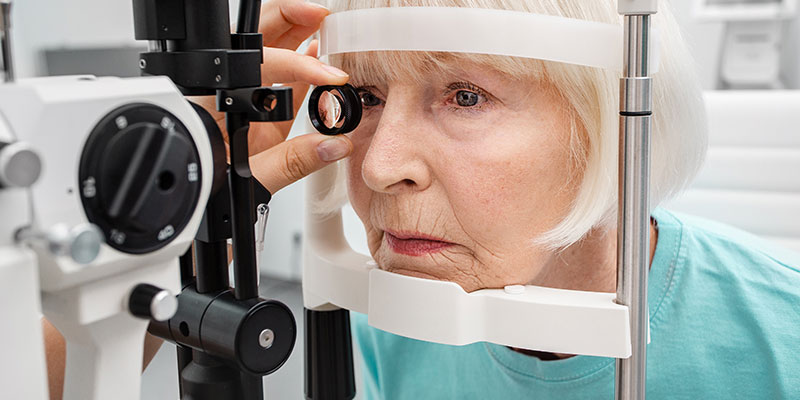Diabetic Eye Exam Medford, MA

The diabetic eye exam is an invaluable part of ensuring that your eyes are healthy and are not suffering any damage. The American Diabetes Association reports that diabetics are more likely to develop glaucoma than people without this disease. This eye disease is more common in people who have had diabetes for a long time. Moreover, as people age, their risk increases.
Diabetes is one of the leading causes of blindness in adults aged 20 to 74 years old. People with diabetes can suffer from diabetic retinopathy, a complication that affects the eyes. Symptoms of diabetic retinopathy include abnormal blood vessels growing from the retina and obstructing the drainage of fluid from the eye. Glaucoma results from this condition. If unaddressed, it can cause vision impairment and ultimately blindness, so it is imperative to prevent it.
Through annual examinations by an ophthalmologist or optometrist, it is possible to prevent vision loss from eye diseases.
What is a Diabetic Eye Examination?
Diabetes eye exams are designed specifically for people with diabetes. This blood-sugar disorder has been linked to damage to the retina and the optic nerve, which is why diabetic eye exams are crucial to maintaining healthy vision.
What are the Benefits of a Diabetic Eye Exam?
Diabetics have high blood sugar levels caused by the disease, which can lead to serious complications such as blindness. Consequently, as part of the process of managing the health complications associated with diabetes, diabetic eye exams play a vital role.
There should be an annual eye examination for diabetics, which includes checking for diabetic retinopathy. However, it is pertinent to note that this is only a general guideline. Depending on the extent of your diabetes, your doctor may recommend a different schedule for you depending on the severity of your condition. If you do not have any severe health or eye conditions, check with your doctor to see if you only need to have your eyes examined about every two years. However, a diabetic eye exam may be recommended more frequently, for example, twice a year if there is a family history of diabetes or if there are other risk factors for developing diabetes in the patient.
The primary reason diabetics need to see their doctors regularly is that those with diabetes are three times more likely to develop age-related macular degeneration, which is the leading cause of blindness in developed countries.
How to Prepare for Your Diabetic Eye Exam?
During the eye examination, your eye doctor will examine the retina and the optic nerve at the back of your eyes. This is a thin layer of tissue that lines the inside of the back part of the eye, called the retina. Basically, the optic nerve is a bundle of nerves that connects your brain to your eye. These nerves are responsible for carrying images from your eyes to your brain.
With the help of an ophthalmoscope, your doctor will shine light into your eyes so they can be examined more closely. This instrument is used to examine the structures within your eyes, such as blood vessels and nerves. It works in an analogous way to a microscope.
What Happens During the Exam?
In a diabetic eye exam, the doctor will review your medical history for diabetes as well as any other medical conditions that may affect your vision. In addition, a thorough physical examination of your eyes and surrounding structures will be performed to look for any signs of eye disease or injury.
This exam can be conducted by a medical professional such as an ophthalmologist, optometrist, or some other qualified healthcare professional trained to perform this type of examination.
How You Can Reduce Your Risk of Glaucoma with a Healthy Diet
In addition to the many benefits of seeing an ophthalmologist at least once a year, prevention is always better than cure. For this reason alone, yearly checkups are not enough to maintain excellent eye health. You must also take responsibility for managing your diabetes during the year.
Remember that this is a lifelong commitment. In the modern world, where there are so many simple, fast-released carbohydrates and sweet ingredients in our daily meals to rapidly increase blood sugar levels, it is challenging to maintain healthy glucose levels. However, you can make several minor changes to your diet to help keep your blood sugar levels balanced. In addition to avoiding sugar-rich foods, you can improve your health by choosing whole grains over white bread.
To sum up, to maintain healthy vision, diabetic eye exams are an invaluable part of maintaining good health. Diabetics are at a higher risk of developing eye problems and diabetic retinopathy than the general population, which can result in vision loss if not treated. The American Academy of Ophthalmology recommends that insulin-dependent patients undergo annual eye exams.
At Jason Gilbert, M.D., P.C., we have a team of board-certified ophthalmologists that provide you with the highest level of care. As ophthalmologists, we can identify diverse types of retinal abnormalities that can be treated by a variety of therapies, such as laser therapy, cryotherapy, or photodynamic therapy. Contact us at 781-395-9916 or visit us online to request an appointment for a comprehensive eye examination.
